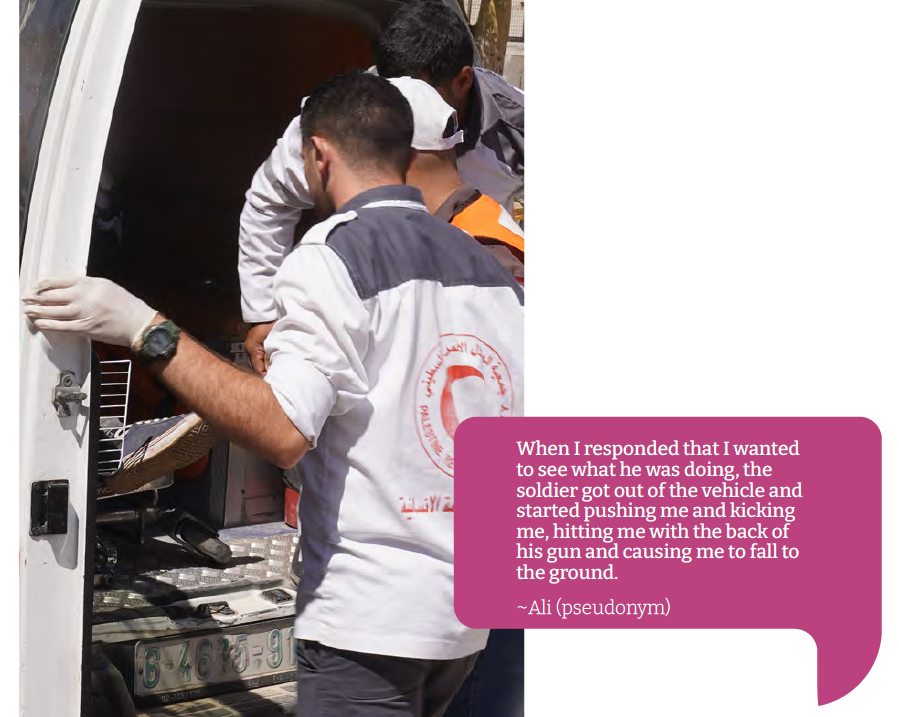On 2 October 2022, a Palestine Red Crescent Society (PRCS) ambulance crew travelled to Beit Furik near Nablus, to provide first aid to persons injured during demonstrations against settlement expansion and incursions in the village, which is in the north of the West Bank.
aid to persons injured during demonstrations against settlement expansion and incursions in the village, which is in the north of the West Bank.
Ali was driving the ambulance, while his colleague Omar1 sat beside him. They crossed the checkpoint leading to Beit Furik without obstruction. However, as the ambulance approached the entrance to the village the crew was confronted with a temporary (flying) checkpoint comprising Israeli soldiers and border guards.
“The soldiers aimed their guns towards us and were shouting at us, ordering us to stop,” said Ali, the driver. “I was driving very slowly, as we are used to doing in situations like this, and stopped behind one of the military jeeps. A soldier came to the window and told me to turn the engine off and give him the keys. He was banging at the window with the back of his gun. I tried to explain that we had information that there were people injured and we needed to reach them.
“After switching off the engine, the soldiers insisted on searching the vehicle. I offered to go to the back of the vehicle with the soldier to open the ambulance for him, but he refused. We are used to going with the soldiers to open the door. They usually want us to be in front of them when they search a vehicle, but this soldier insisted on going alone. Because of this, I was afraid he might try to plant a weapon or a knife on the vehicle and make an accusation against us. I wanted to see what he was doing, but another soldier stood by my door, aiming his weapon at me, and preventing me from leaving the vehicle or seeing behind.
“The ambulance vehicle automatically locked when the soldier tried to open it. He then shouted towards me ordering me to open the backdoor, which I did. I left the ambulance and went towards the backdoor. At this point the soldier shouted at me again, asking why I was there. When I responded that I wanted to see what he was doing, the soldier got out of the vehicle and started pushing me and kicking me, hitting me with the back of his gun and causing me to fall to the ground.
“Omar came out of the vehicle and tried to help me. Another soldier beside the ambulance came and started pushing Omar, while a further 3 soldiers joined and were surrounding us and pushing us away from the ambulance.”
At the point that Ali and Omar had been pushed away from the vehicle, someone in the nearby demonstration began recording what was happening in a video on their phone. The video shows the soldiers pushing, kicking and beating the paramedics before they are both made to kneel on the ground.
“When we were on the ground, someone was trying to call me. I answered the call on speaker so that the person on the line would know we were in danger. That person contacted the Palestinian Coordination Office, who arrived on site shortly afterwards. Following negotiation, we were released. Another ambulance came to take Omar to hospital for treatment, while I provided information to the officer from the Coordination Office. I then drove myself to hospital.”
As a result of the attack, Ali sustained injuries to his leg including tear of a cartilage in his knee, requiring treatment for the pain and physiotherapy. He returned to work after 40 days.
“Even after my injury, I will go back to the field. Even if it means that something can happen to me, this is our duty. We were raised this way; this is who we are. It’s not the first time I was exposed to violence from soldiers. I worked during the Second Intifada, when we were fired at with live ammunition. We had a female patient in the ambulance at the time. The violations against us have continued all these years. We are still prevented from reaching injured people, pushed around by soldiers, and shot at. Our safety depends on the mood of the soldiers.”


